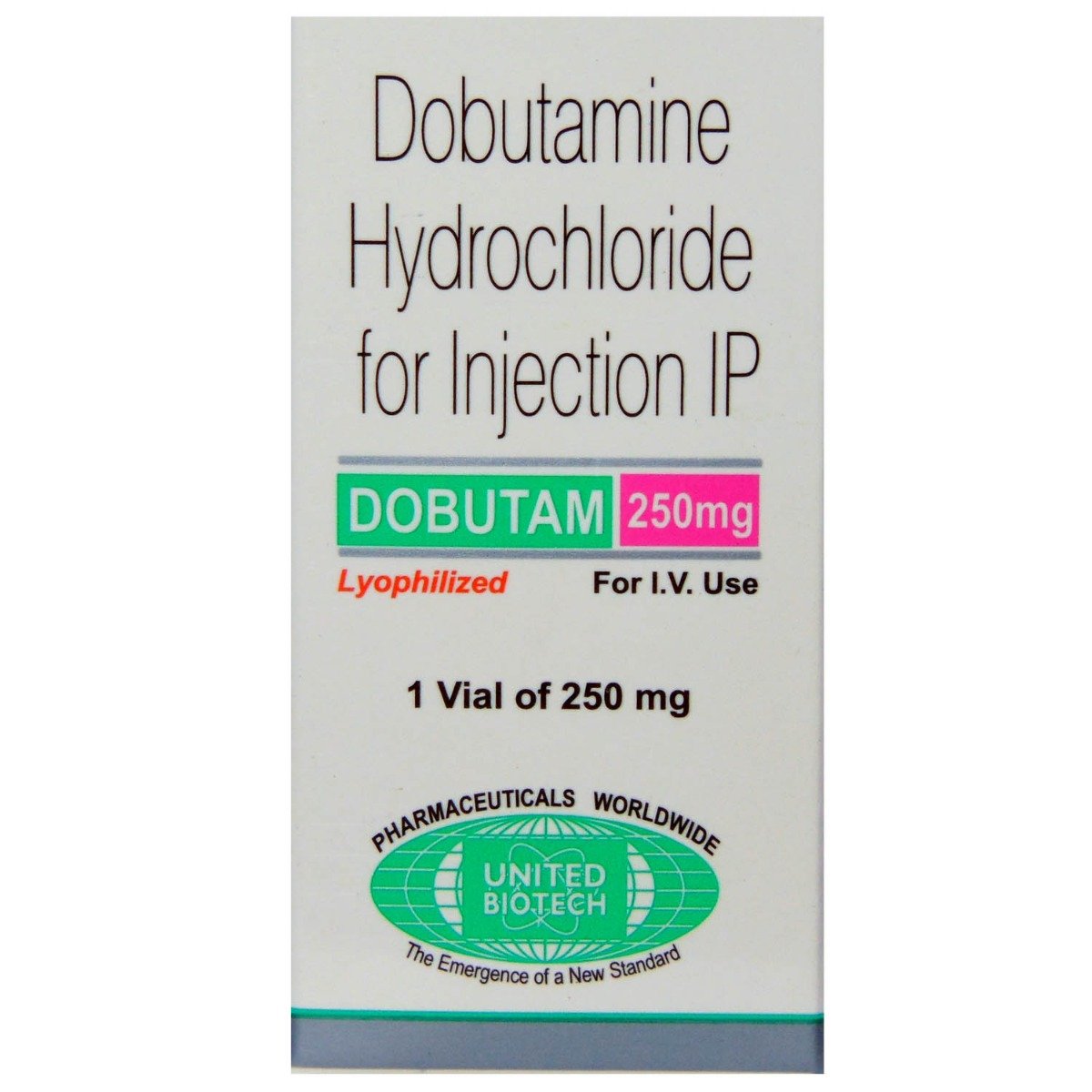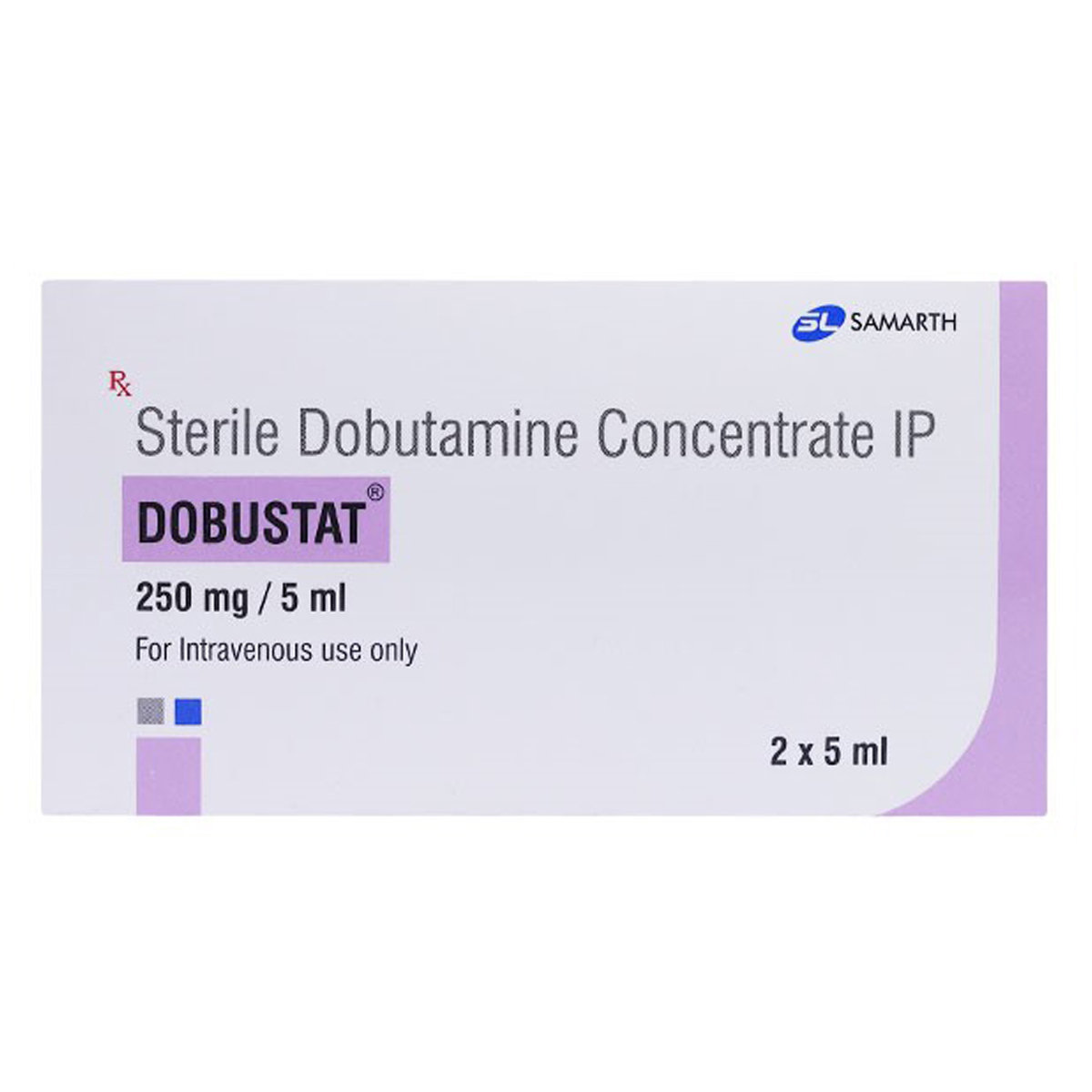Dobutamine
About Dobutamine
Dobutamine belongs to a class of medicines called vasopressors used to treat patients with low cardiac output, decompensated heart failure (DHF), and Myocardial infarction (MI). Myocardial infarction, also known as a heart attack, could occur due to the lack of blood and oxygen supply to the heart. Cardiac decompensation is an abnormal condition in which the heart is no longer able to maintain efficient circulation.
Dobutamine contains Dobutamine which works by increasing blood flow to the muscles and increasing the pumping efficiency of the heart.
Dobutamine will be administered by a healthcare professional. Hence, do not self-administer. Sometimes, Dobutamine may cause common side effects such as headache, nausea, shortness of breath, chest pain, irregular heartbeat and pain at the site of injection. Most of these side effects do not require medical attention and gradually resolve over time. However, if the side effects persist, please consult your doctor.
If you are allergic to Dobutamine or other ingredients of Dobutamine, please inform your doctor. If you are pregnant or breastfeeding or have a history of blood circulation problems, inform your doctor before receiving Dobutamine. Dobutamine is not recommended for children as safety and effectiveness are not established.
Uses of Dobutamine
Medicinal Benefits
Dobutamine contains Dobutamine which is used to treat Cardiac decompensation and low cardiac output patients. It works by increasing blood flow to the muscles. Additionally, it may be used in people with congestive heart failure (heart failure due to the build-up of blood or fluid) to help the heart pump better by increasing the pumping efficiency of the heart.
Directions for Use
- Follow your doctor’s instructions on the dosage and timing of this medication to ensure safety.
- Dobutamine will be administered by the doctor or healthcare professional in a medical setting.
- Do not self-administer.
Storage
Side Effects of Dobutamine
- Headache
- Nausea
- Shortness of breath
- Chest pain
- Irregular heartbeat
- Injection site reactions
Drug Warnings
If you are allergic to Dobutamine or any other ingredients of Dobutamine, please tell your doctor. Dobutamine is not recommended for children as safety and effectiveness were not established. If you are pregnant or breastfeeding, please inform your doctor before receiving Dobutamine. If you have a history of blood circulation problems, inform your doctor, as you will be monitored for any changes in the colour or temperature of your fingers or toes. If you experience any pain or swelling at the injection site during or immediately after the injection, inform your doctor immediately so that appropriate treatment may be given.
Drug Interactions
Drug-Drug Interactions: Caution should be maintained if you are taking beta-blockers (propranolol, metoprolol), anticonvulsants (phenytoin), antipsychotics (Amoxapine), anti-depressants (e.g. amitriptyline, clomipramine, imipramine, nortriptyline) inform your doctor before receiving Dobutamine.
Drug-Food Interactions: No interactions found.
Drug-Disease Interactions: Avoid receiving Dobutamine if you have hyperthyroidism (overactive thyroid gland), irregular or rapid heartbeats or a tumour that causes an increase in blood pressure. If you have a history of blood circulation problems or have diabetes, high blood pressure, Raynaud’s disease (fingers become white and very painful when cold), or liver or kidney problems, inform your doctor before receiving Dobutamine.
Drug-Drug Interactions Checker List:
Safety Advice

Alcohol
cautionAvoid consumption of alcohol. Please discuss with your doctor if you have concerns.

Pregnancy
cautionDobutamine is considered safe to be used in pregnancy. However, if you are pregnant or planning pregnancy, inform your doctor before receiving Dobutamine.

Breast Feeding
cautionLimited data are available on the effect of Dobutamine on breastfeeding. Hence, if you are a nursing mother, inform your doctor before receiving Dobutamine.

Driving
not applicableDobutamine is generally intended for use in hospitalized patients.

Liver
cautionIf you have liver problems, inform your doctor before receiving Dobutamine. Your doctor may adjust the dose of this medicine if necessary or prescribe a suitable alternative based on your condition.

Kidney
cautionIf you have kidney problems, inform your doctor before receiving Dobutamine. Your doctor may adjust the dose of this medicine if necessary or prescribe a suitable alternative based on your condition.

Children
unsafeDobutamine is not recommended for children as safety and effectiveness were not established in children.
Habit Forming
Diet & Lifestyle Advise
- Eat small meals more frequently.
- Drink plenty of fluids to stay hydrated as dehydration may reduce blood volume resulting in low blood pressure.
- Include vitamin B12-rich foods such as animal meats, eggs, fortified cereals, and nutritional yeast.
- Take frequent breaks if you exercise outdoors in extreme heat.
- Avoid spending a long time in hot tubs, steam rooms, and saunas to prevent dehydration.
Patients Concern
Disease/Condition Glossary
Myocardial infarction (MI)/Heart attack: It occurs when a blood clot blocks the blood flow to the heart. This blockage of arteries is often an accumulation of fat, cholesterol and other substances, which form plaque in the arteries that feed the heart (coronary arteries). Heart attack signs include chest pain, upper body pain, sweating, nausea, fatigue, and trouble breathing.
Decompensated heart failure (DHF): It is a condition in which the heart is no longer able to maintain efficient circulation. This leads to the sudden onset of symptoms of heart failure.
FAQs
Dobutamine is used to treat Myocardial infarction and Decompensated heart failure.
Dobutamine contains Dobutamine which works by increasing blood flow to the muscles and increasing the pumping efficiency of the heart.
Dobutamine should be used with caution in diabetic patients as it may cause Dobutamine stress echocardiography. Therefore, if you have diabetes, inform your doctor before receiving Dobutamine.
The common side effects of Dobutamine include headache, nausea, shortness of breath, chest pain, irregular heartbeat and pain at the site of injection. Most of these side effects do not require medical attention and gradually resolve over time. However, if the side effects persist, please consult your doctor.
Dobutamine can be used for children if recommended by a doctor or paediatrician. It is generally used for the treatment of low cardiac output and systemic blood pressure in children of all ages. However, the dosage will be determined by the doctor based on the child's weight, age, and specific medical condition.
Dobutamine is not a steroid. It belongs to a class of medicines called vasopressors and works by increasing blood flow to the muscles and improving the pumping efficiency of the heart. It does not have anti-inflammatory properties like steroids.




